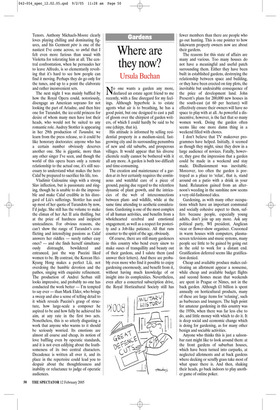Where are they now?
Ursula Buchan
No one wants a garden any more, declared an estate agent friend to me recently, with a fine disregard for my feelings. Although hyperbole is to estate agents what air is to breathing, he has a good point, but one designed to cast a pall of gloom over the chirpiest of garden writers, of which I could hardly be said to be one (chirpy, that is).
His attitude is informed by selling residential property in a medium-sized, fastgrowing city and its surrounding penumbra of new and old suburbs, and prosperous villages. It would appear that his diverse clientele really cannot be bothered with it all any more. A garden is both too difficult and time-consuming.
The creation and maintenance of a garden at its best certainly requires the continuous and watchful care of a piece of ground, paying due regard to the relentless dynamic of plant growth, and the intricacies of the web of interconnections between plantand wildlife, while at the same time attending to aesthetic considerations. Gardening is one of the most complex of all human activities, and benefits from a wholehearted cerebral and emotional engagement, as well as a respect for posterity and a Job-like patience. All that runs counter to the spirit of the age, obviously.
Of course, there are still many gardeners in this country who bend every sinew to make oases of tranquillity and beauty out of their gardens, and I salute them (and answer their letters). And there are probably even more who find it possible to enjoy gardening enormously, and benefit from it, without having much knowledge of or insight into its complexities. Nevertheless, even after a concerted subscription drive, the Royal Horticultural Society still has fewer members than there are people who go out hunting. This is one pointer to how lukewarm property owners now are about their gardens.
The reasons for this state of affairs are many and various. Too many houses do not have a meaningful and useful patch surrounding them. Either they have been built in established gardens, destroying the relationship between space and building, or they have been erected on tiny plots, the inevitable but undesirable consequence of the price of development land. John Prescott’s plans for 200,000 new houses in the south-east (at 60 per hectare) will effectively ensure their owners will have no space to play with at all. As powerful a disincentive, however, is the fact that so many women work. Doing the garden often seems like one more damn thing in a weekend filled with chores.
I don’t believe that TV makeover programmes have helped. Initially, it seemed as though they might, since they drew in a large audience of novices. Fatally, however, they gave the impression that a garden could be made in a weekend and stay made. Disillusionment was inevitable. Moreover, too often the garden is portrayed as a place to ‘relax’, that is, stand around on a patio with a drink in your hand. Relaxation gained from an afternoon’s weeding in the sunshine now seems a very old-fashioned idea.
Gardening, as with many other occupations which have an important communal and socially cohesive aspect to them, suffers because people, especially young adults, don’t join up any more. Ask any political party, WI president, Anglican vicar or flower-show organiser. Cocooned in warm houses with computers, plasmascreen televisions and music systems, many people see little to be gained by going out in the cold to work for a distant end. Gratification deferred seems like gratification denied.
Cheap and available produce makes cultivating an allotment appear a nonsense, while cheap and available budget flights and second homes mean that weekends are spent in Prague or Nîmes, not in the back garden. Although £1 billion is spent annually on horticultural products, many of these are large items for ‘relaxing’, such as barbecues and loungers. The high point for amateur gardening in this country was the 1950s, when there was far less else to do, and little money with which to do it. It is deep social and economic change which is doing for gardening, as for many other benign and sociable activities.
Anyone who thinks this is just a saloonbar rant might like to look around them: at the front gardens of suburban houses, which have been turned into carparks, at neglected allotments and at back gardens where decking or scruffy grass take most of what space there is. And then, shaking their heads, go back indoors to play another game of online poker.













































 Previous page
Previous page